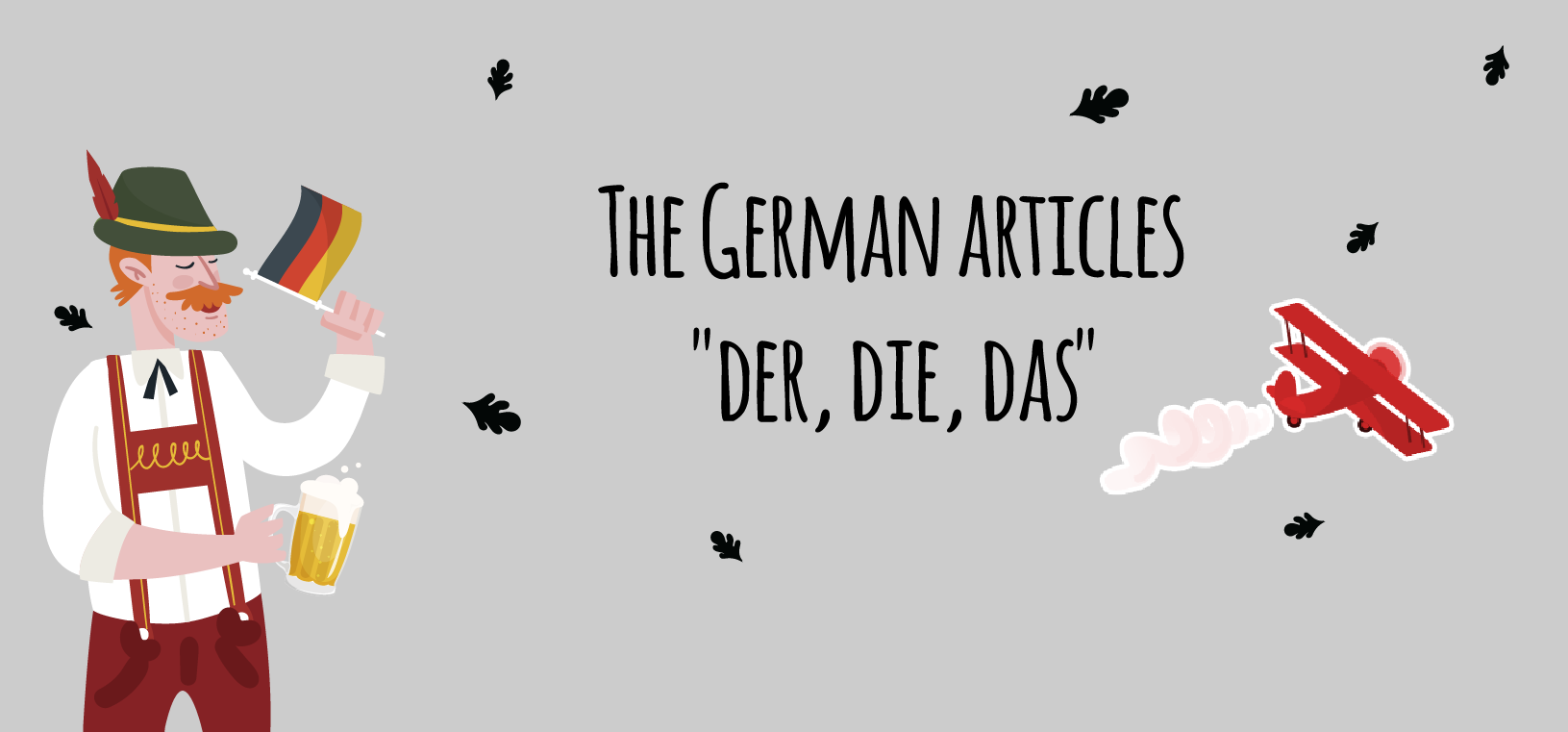The German articles “der, die, das”

The German articles “der, die, das”
INDEX OF CONTENTS
- The article ‘der’ (the)
- Endings give advice: they are masculine
- The feminine article says “the”
- Endings give advice: they are feminine
- The neutral article (neutral) das (that)
In German as in many other languages, nouns differ by gender . Each noun also has a partner, the article. Since the gender of the noun is not normally seen in German , it is the article that provides information about it. So the best advice is: It is better to always learn the word along with the article!
But there are some suggestions that can be used to find the correct article: for example, by means of the meaning or the ending. But you have to be very careful: there are almost always exceptions.
Here you will learn an important part of German grammar: the German articles “der, die, das” – rules and explanations. Remember, this is a must for any official German exam
The article der (the)
First, a distinction can be made according to natural gender, that is, man, student, teacher, child, specialist.
- Achtung bei: das Kind, das Baby!
Attention: the child, the baby!
- Auch die Bedeutung gibt Hinweise: maskulin sind
The meaning also gives clues: they are masculine
- Tageszeiten der Morgen, der Abend, etc.
Hours of the day in the morning, in the afternoon, etc.
- Wochentage der Montag, der Mittwoch, der Freitag, etc.
Seasons of summer, winter, etc.
- Wochentage der Montag, der Mittwoch, der Freitag, etc.
Weekdays Monday, Wednesday, Friday, etc.
- Monate der April, der Juni, der September, etc.
Months of April, June, September, etc.
- Wetter der Regen, der Schnee, der Blitz, etc.
Respect rain, snow, lightning, etc.
- Himmelsrichtungen der Süden, der Westen, der Osten, etc.
Cardinal points to the south, west, east, etc.
- Automarken der VW, der Fiat, der Renault, etc.
Car brands of VW, Fiat, Renault, etc.
The endings also give advice: they are masculine
- Er der Computer, der Drucker, der Laser, etc.
computer, printer, laser, etc.
- Ling der Schmetterling, der Frühling, der Lehrling, etc.
the butterfly, the spring, the apprentice, etc.
- Or der Professor, der Motor, der Reaktor, etc.
or the teacher, the engine, the reactor, etc.
- ist der Journalist, der Pazifist, der Maschinist, etc.
he is the journalist, the pacifist, the machinist, etc.
- der Mechanismus, der Journalismus, der Kapitalismus, etc.
the mechanism, journalism, capitalism, etc.
The feminine article die “the”
Here, too, a distinction can be made initially according to natural gender , that is, the woman, the teacher, the professor, the gifted.
- Achtung bei: das Mädchen, das Weib!
Attention: the girl, the woman!
Again, the meaning gives clues: they are feminine.
- Motorradmarken die Suzuki, die Harley Davidson, die Triumph
Motorcycle brands Suzuki, Harley Davidson, Triumph
- Schiffsnamen die Queen Elisabeth, die Gorch Fock, die Europe, etc.
The ship names Queen Elisabeth, Gorch Fock, Europe, etc.
- Flugzeuge die Boing, die Concorde, die Robin, etc.
Aircraft the Boing, the Concorde, the Robin, etc.
- Zahlen die Eins, die Sieben, die Neun, etc.
Pay one, seven, nine, etc.
- Blumen die Tulpe, die Rose, die Narzisse, etc.
The tulip, the rose, the narcissus, etc.
Endings give advice: they are feminine
- – e: die Lampe, die Ente, die Tasche, etc.
the lamp, the duck, the bag, etc.
- -t: die Fahrt, die Naht, die Tat, etc.
On the walk, sewing, writing, etc.
- -ei: die Bäckerei, die Tyrannei, die Wäscherei, etc.
the bakery, tyranny, laundry, etc.
- -in: (va weibliche Berufe) die Professorin, die Studentin, die Prinzessin, etc.
(especially female professions) the teacher, the student, the princess, etc.
- schaft: die Mannschaft, die Belegschaft, die Freundschaft, etc.
the team, the staff, the friendship, etc.
- heit / -keit: die Freiheit, die Einsamkeit, die Möglichkeit, etc.
freedom, loneliness, opportunity, etc.
- – ung die Zeitung, die Umleitung, die Meinung, etc.
the newspaper, fun, opinion, etc.
Foreign word endings are also useful: they are feminine
- -ion: die Aktion, die Diskussion, die Tradition, etc.
of action, discussion, tradition, etc.
- age: die Gage, die Passage, die Garage, etc.
old the rate, the passage, the garage, etc.
- ur: die Manufaktur, die Agentur, die Partitur, etc.
just the making, the agency, the score, etc.
- ik: die Musik, die Physik, die Metrik, etc.
ik music, physics, meter, etc.
- anz: die Akzeptanz, die Toleranz, die Eleganz, etc.
Acceptance, acceptance, tolerance, elegance, etc.
- tät: die Realität, die Modernität, die Qualität, etc.
makes reality, modernity, quality, etc.
- ade: die Limonade, die Parade, die Marmelade, etc.
the lemonade, the parade, the jam, etc.
- enzy: die Präsenz, die Prominenz, die Tendenz, etc.
En the presence, prominence, trend, etc.
The neutral article (neutral) gives “that”
Here, too, the meaning provides clues: they are neutral.
- Farben das Blau, das Grün, das Weiß, etc.
Color blue, green, white, etc.
- Metalle das Silber, das Gold, das Eisen, etc.
Metallizes silver, gold, iron, etc.
- Chemische Elemente das Helium, das Uran, das Neon, etc.
Chemical elements helium, uranium, neon, etc.
- Substantivierte Verben das Lesen, das Schlafen, das Schwimmen, et
Nouns, verbs to read, sleep, swim, etc.
- Substantivierte Adjektive das Schöne, das Gute, das Helle, etc.
Nouns the beautiful, the good, the brilliant, etc.
The endings also give advice: they are neutral
- Diminuitive (-chen / -lein) das Häuschen, das Mädchen, das Kindlein, etc.
Diminuitive (-chen / -lein) the little house, the girl, the boy, etc.
- um das Museum, das Atomium, das Publikum, etc.
museum, the Atomium, the public, etc.
- nis das Ereignis, das Wagnis, das Erlebnis, etc.
the event, the risk, the experience, etc.
- tum das Ultimatum, das Beamtentum, das Brauchtum, etc.
ultimatums, bureaucracy, customs, etc.
- ment das Regiment, das Parlament, das Instrument, etc.
the regiment, parliament, instrument, etc.
- or das Auto, das Motto, das Kino, etc.
-or the car, the motto, the cinema, etc.


